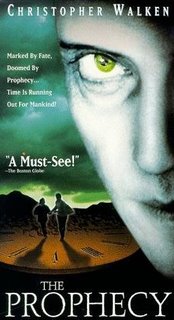 Well, Fallen (an ABC Family TV movie which tells the tale of Aaron Corbett, who discovers on his 18th birthday that he’s really a Nephilim—half-human, half-angel—complete with a prophecy that predicts he’s the one who will redeem the "Fallen" angels who rebelled against God to their former glory) didn’t fall far from what I expected. True to previous reviews, it boasted a very foggy spirituality where angels walk among us with terrible powers and God is talked about in nebulous terms and far removed. (By the way, Mirathon has a wonderful discourse on how these types of films have a screwed up angelology and an "Absent Lord".)
Well, Fallen (an ABC Family TV movie which tells the tale of Aaron Corbett, who discovers on his 18th birthday that he’s really a Nephilim—half-human, half-angel—complete with a prophecy that predicts he’s the one who will redeem the "Fallen" angels who rebelled against God to their former glory) didn’t fall far from what I expected. True to previous reviews, it boasted a very foggy spirituality where angels walk among us with terrible powers and God is talked about in nebulous terms and far removed. (By the way, Mirathon has a wonderful discourse on how these types of films have a screwed up angelology and an "Absent Lord".)That being said, I have a weakness for B-movie fare—and I actually found some things worth digging out of this one. And here’s why: despite their billing, I find films like these are less about angels and more about human experiences and longings when it comes to faith, God and redemption.
 Fallen bears remarkable similarities to another angel film: The Prophecy, a much-darker flick staring Eric Stoltz, Christopher Walken (who makes one of the scarier and most disturbing angels I’ve seen on celluloid) and Viggo Mortensen (yes, that Viggo, as a chilling Satan). In both films, there’s a war playing out amongst us in the angelic realm that has less to do with God and more to do with angelic agendas. A secret prophesy exists concerning angels that we humans, of course, know nothing about. God undoubtedly exists but is somewhat if not entirely hands off. And the some of the angelic behavior—particularly the you-can-smell-an-angel-a-mile-away thing and the referring to humans as “monkeys” (hearing Walken wax this term, however, is much more creepy than the angels of Fallen, who just can't hold a candle to him, ack)—are remarkably similar.
Fallen bears remarkable similarities to another angel film: The Prophecy, a much-darker flick staring Eric Stoltz, Christopher Walken (who makes one of the scarier and most disturbing angels I’ve seen on celluloid) and Viggo Mortensen (yes, that Viggo, as a chilling Satan). In both films, there’s a war playing out amongst us in the angelic realm that has less to do with God and more to do with angelic agendas. A secret prophesy exists concerning angels that we humans, of course, know nothing about. God undoubtedly exists but is somewhat if not entirely hands off. And the some of the angelic behavior—particularly the you-can-smell-an-angel-a-mile-away thing and the referring to humans as “monkeys” (hearing Walken wax this term, however, is much more creepy than the angels of Fallen, who just can't hold a candle to him, ack)—are remarkably similar.In both films, however, the angelic fears, longings and agendas have more in common with humanity than celestial beings—which makes these films (in my opinion, anyway) more about how human issues than winged ones.
For example, in both films, the angels—like humans—are consumed with the desire for a clear sense of purpose from God. At one point in Fallen, Verchiel (the ruthless angel who heads the hunt for the Fallen—those angels who were banished to earth with clipped wings because they rebelled against God “and his teachings”) is on her knees begging God for a sign that what she’s doing is the right thing. She wants to know that her actions and desires are part of a larger purpose—God’s purpose. Another angel, Cameal—who used to hunt the Nephilim but now protects them—tells Corbett that he thought it “my holy mission to eradicate the Fallen and their offspring.” But once he looked into the prophecy (concerning a Nephilim that “would be born who would forgive the Fallen of their sins”), Cameal says he could no longer be a part of the killing: “I saw the Creator had a plan much greater than I could comprehend. . . . I realized I had to save those that the [angelic] Powers wish to destroy.”
This is less an angelic desire or agenda than a human one. We all want a sense of purpose—that we are part of a larger, good, triumphant plan. (Rick Warren’s Purpose Driven Life and the Ashley Smith story are prime examples of how that is playing out in current culture.) Films like this project onto angels what we ourselves desire and long for.
Another aspect of Fallen worth looking at is how radically our lives change once we realize and accept that a spiritual world lives and breathes around us. For Corbett, this is utterly earth shattering. “All I ever wanted was a normal life,” he tells Cameal at one point. “All this angel stuff, I can’t take it. I don’t want any part of it.” Likewise, when we become aware of and surrender our lives to God and his Kingdom, we also become acutely aware of the breadth and depth of the spiritual world in which we live and breathe and that what our culture holds as a “normal” life is no longer possible for us. Our lives are changed forever—no going back. As Corbett says at the end of the film, “My future is not my own. My destiny has been rewritten.”
More than any other, perhaps, I resonate with that aspect of Fallen. The longer I follow Jesus—the more he transforms me, the further I walk into the Kingdom—the more sense I have that my future is not my own, that my destiny is being rewritten. Unlike Corbett, however, I wouldn’t have it any other way. This is real life, and it is so much better than a “normal” one.
As a third example, in both films there is as strong desire (in some of the angels, at least) for redemption. In Fallen, that is accentuated by Tom Skerritt’s Zeke, a Fallen who has corroborated with the Powers (those angels bent on eradicating Nephilim) in ferreting out the half-angels—even his own daughter. He voices throughout the film a desperate desire for redemption, but (for most of the film) it’s more a selfish longing to escape banishment from Earth than a deep recognition of his need for redemption.
Ultimately (and very interestingly), however, redemption isn’t granted just because it’s highly desired. At the end of the movie, Zeke is dying (though angels are practically immortal in these flicks, they are capable of being killed), having suffered a mortal wound in trying to protect Corbett. If Corbett (who’s accepted his destiny by this point) uses his newly found powers to grant Zeke redemption and the ability for his spirit to return to God, it will cost him the “normal” life he wants so badly.
So, Corbett asks Zeke a crucial question: “Do you regret letting others die so you could live?”
“Yes,” Zeke says, and he means it this time.
“So would I,” Corbett says, laying his hands on Zeke’s body and allowing his spirit to return to God.
There’s an implication here that actions (no matter how self-sacrificing) can't bring redemption. There's a different step needed: a sense of regret and recognition of one’s actions as wrong—what I think most Christians would call repentance. And I find the presence of that idea in a mostly secular film about angels highly intriguing.
This scene, more than any other, also had personal implications for me. Corbett is willing to accept reality and his identity and to leave his family and “normal” life to do the right thing—to play his part in Zeke’s redemption. I couldn’t help thinking, how much am I willing to give up to be Jesus’ hands, to enter God’s plan for the healing and redemption of Creation? Or are there parts of the “normal” life I’m not willing to part with? Are there people I’m not willing to risk it all for? It’s good food for thought.
So, there you have it: a few tidbits of God-talk sifted from a very theologically fuzzy and admittedly B-movie about angels, Nephilim, prophecies, God and redeemers—which, in the end, seems like it may be too much from too little. Ack.
But it sure was fun to write about.
Heh.
(Images: Death and the Gravedigger: Wikipedia; The Prophecy: Amazon) miscctgy